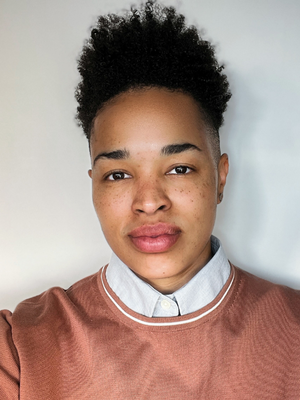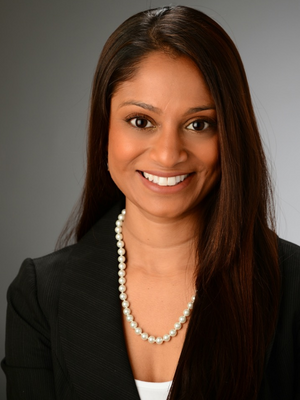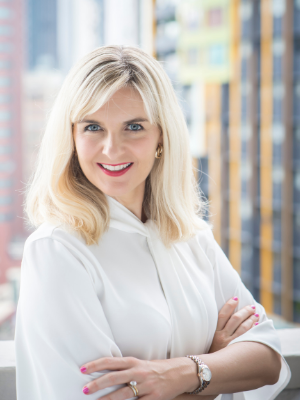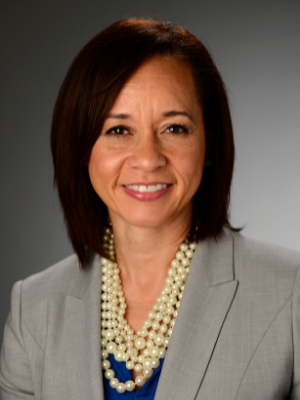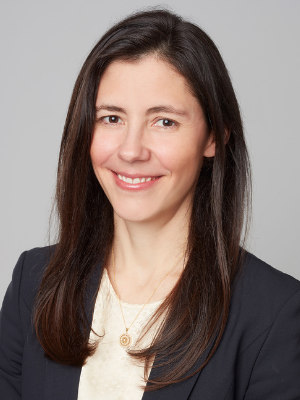 “Somewhere along the way of observing women progress in their careers, I realized that no one ever got very far if they cared too much about: What do others think? How did I come across? Was I likeable? And so on,” says Marcella Sivilotti. “You get to a certain place because you channeled that energy not on worrying about whether people like you or your answer, but on asking how do I get the job at hand done?”
“Somewhere along the way of observing women progress in their careers, I realized that no one ever got very far if they cared too much about: What do others think? How did I come across? Was I likeable? And so on,” says Marcella Sivilotti. “You get to a certain place because you channeled that energy not on worrying about whether people like you or your answer, but on asking how do I get the job at hand done?”
Structuring Strategic Issues
Having studied industrial engineering in Rome, Marcella mastered the ability to approach any practical problem–including business problems–with an analytical lens: How do you maximize profit? What is the shortest path? The ability to streamline problems and structure solutions led her to management consulting with McKinsey. She transferred to the US with the firm to obtain an MBA from Columbia. What began as a two-year stint has led to almost 15 years in the US, and a career and family now firmly established in New York.
In 2014, ready to shift from consulting to working to implement change within companies, Marcella joined PGIM, the $1.2 trillion asset management arm of Prudential Financial. Now she leads a small but high-impact team who advises senior management on the strategic direction and priorities of the business, that also strongly factor in the human element of every equation.
“As an advisor, you look at the data and the range of strategic options. But, there’s also: Where is this person coming from as they assess this decision? What makes them click? What are their concerns, spoken or unspoken?” she says. “So there’s a lot of psychology involved when you’re on the other side.”
Marcella is animated by the constant variety her role offers: “I’ve been at the company for over eight years, and every day there’s some new aspect of the business I have not looked into and a new problem to solve.” She loves applying the same analytic framework to new kinds of problems – identifying the variables, finding possible solutions and assessing the best path forward in partnership with the senior business leaders she advises.
Coming from consulting, Marcella has been inspired to find that the PGIM culture is not about making the decision that is going to look good in front of your boss, but rather about managing the business with a long-term mindset. She points out that investment management is all about generating returns in a very measurable way. And it’s exactly that accountability that necessitates honest discussions and a willingness to engage in fruitful debate and open exchanges of ideas and views with passion and respect, which she loves. She enjoys working with smart and motivated people and says, “People here care about doing the right thing by the business.”
Giving and Receiving the Feedback We Need to Grow
Marcella is animated by leading and shaping a team. She enjoys the human element of influencing behavior: “It’s less about what looks good in a PowerPoint deck and more about how to make things happen in the complex, messy real world. Importantly, that requires establishing trust, and modulating between ‘when do I need to be nice and accommodating?’ versus ‘when do I need to give the gift of direct and honest feedback?’”
Marcella seeks to strike that delicate balance both in leading her team and in her advising role. In leading a team: “There is a balance between creating a caring and ‘fail safe’ team environment (where it’s okay not to be perfect and bring what you’re good at and what you’re not good and it’s understood that everybody has both aspects) and also having a focus on giving clear feedback,” she discerns. “Everybody loves to be told they are great, but that’s not always conducive to growth. So how do you make sure people get the tough message when it’s warranted, without it coming across as failure but rather as an opportunity and source of growth?”
In her advisory role: “When I advise people, if I just tell them what they want to be told, I am useless. Because that’s not good advice,” she notes.
She herself has learned to better embrace both giving and receiving tough feedback and position it not as a deficit but as a developmental edge.
Take Your Attention Away from What Others Think
At the core of her own success is two things. The first is being a logical and structured thinker–always beginning with ‘what do we know’ and ‘what do we not know?’ The second is being able to relate to people, to read them and also not shy away from being candid as a leader.
When it comes to fulfilling potential, Marcella points out that if you listen to the stories of either men or women in leadership, they stopped preoccupying themselves with what other people were thinking or how they came across, and instead liberated themselves to focus on how to achieve their visions. And if there’s one thing she could have known sooner, it would be that.
She also picked up the value of conviction and resilience. “If you’re told ‘no’ once, just have another go. No one ever got far because they got pessimistic the first time they failed. As the saying goes, it’s about how many times you get back up.”
From university onwards, Marcella has been used to being the one, or one of the few, women in the room. Against that backdrop, she has focused on what she wants to achieve, avoided getting caught up in the politics, and shown up as candid and outspoken with conscious disregard for whatever societal expectations may be at play.
Passion is Showing Up and Growing
As a leader, Marcella hopes to infuse her team with a good measure of passion, involvement and caring about the outcomes they create together.
“You hear lately about ‘quiet quitting’ and how people come to work because they want to get a paycheck, but they’re tuned out. I can’t imagine that, because if that ever happened to me, I’d rather just quit,” she says. “When it comes to solving problems, I like the fact that I do feel a measure of responsibility for the outcome and the quality of work we put in. I’m lucky to have been able to build and be supported by a team that shares that same spirit.”
The other thing she likes to convey to her team is to not be too serious and to always keep some perspective around the work. In supporting a growth culture, Marcella feels it’s so important that people realize that it is okay to fail.
“There is that saying, ‘you miss 100% of the shots you don’t take.’ If the aim is to be perfect and never make the wrong decision, by definition there’s an element of faking or over-conservatism,” she says, “because just to ensure you don’t ever make the wrong move, you’re never going to make a move. But investment professionals make decisions for a living and no one will ever be right 100% of the time. That comes with the job.”
Being A Mom Has Only Added to Her Game
In the past three years, Marcella has become a mom and feels bringing up her two kids has strengthened her leadership.
“Becoming a parent makes you so resilient. It’s a great exercise in messing up 50 times a day. Before having children, I may have ruminated on how a meeting didn’t go well,” she says. “Now, I can put it in the context of the 50 others ways I was challenged today. I don’t have time to get stuck on it.”
It has also made her more efficient and laser-focused on the most important aspects of any problem, because she still wants to achieve everything with high quality, but must make it happen in more limited hours. She feels the direct and challenging experience of balancing personal and work life as a parent has also given her more compassion and empathy for others.
“You realize that everybody may have something they’re trying to cope with – whether it’s parenting, caring for someone who is unwell, or a breakup,” she says. “So it’s about being more attuned. I may not know what it is you are dealing with, but I’m going to be empathetic and an ally.”
Time and again, the human element weighs strongly in the equation.
By Aimee Hansen

